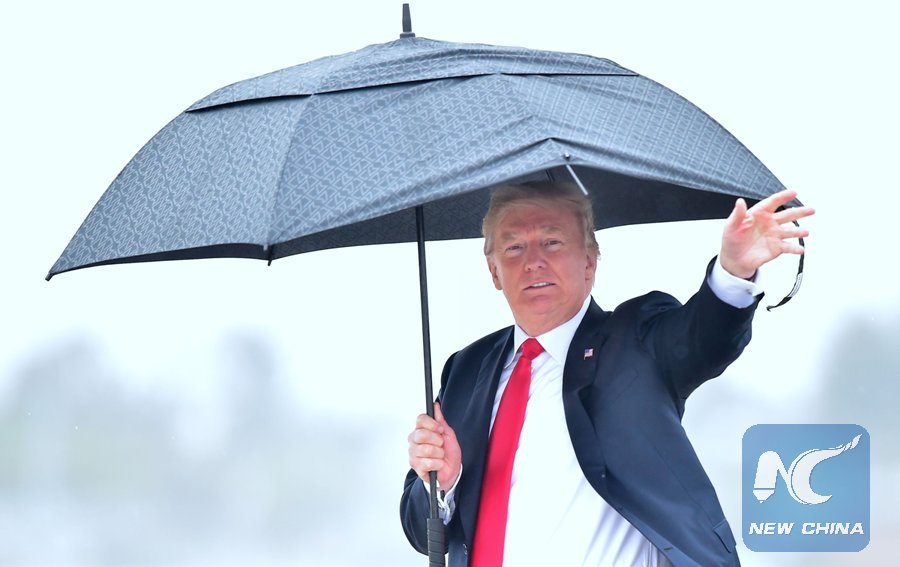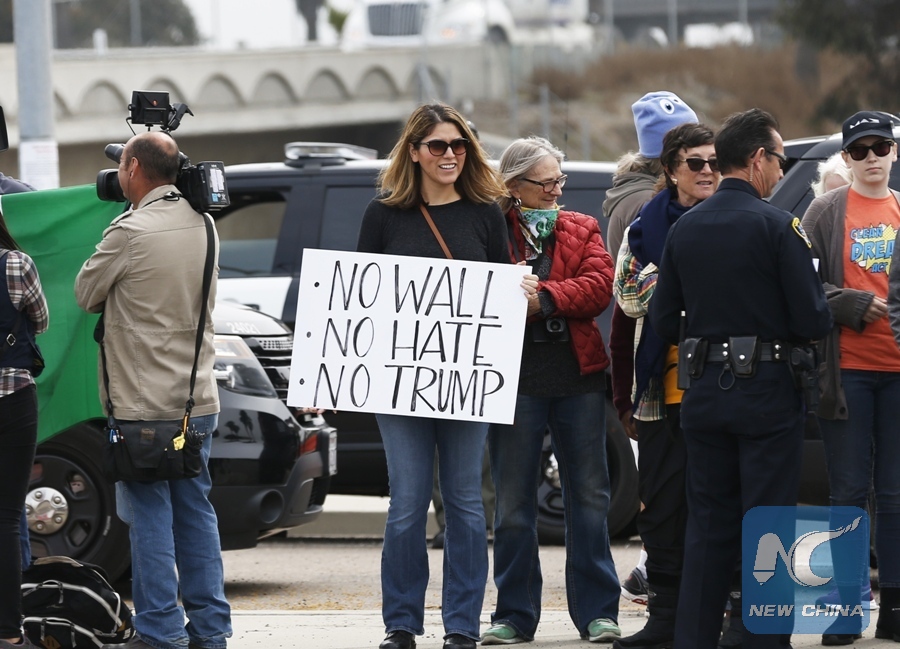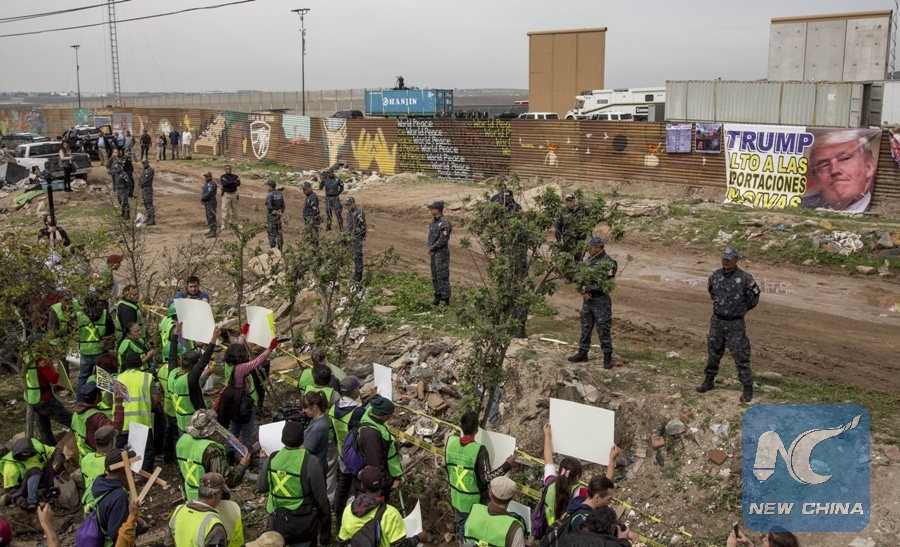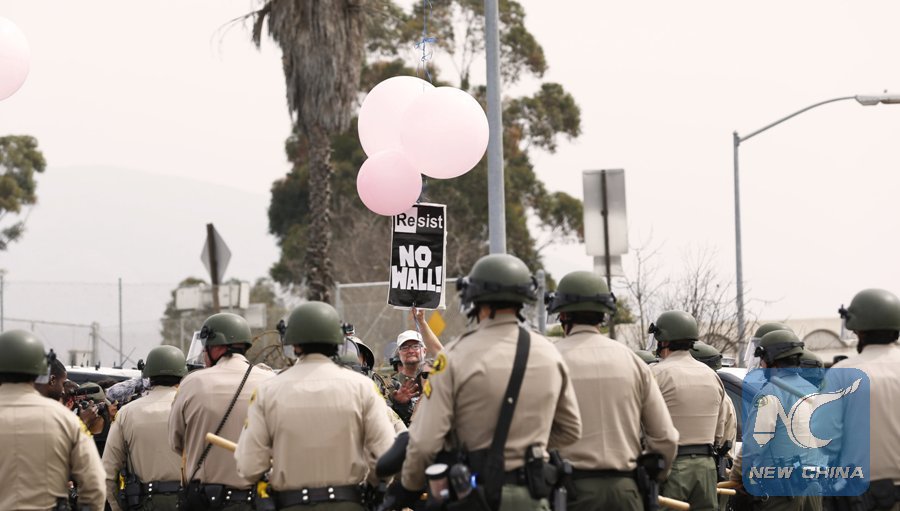
U.S. President Donald Trump waves while holding his umbrella walking under the rain on arrival in Los Angeles, California on March 13, 2018. (Xinhua/AFP)
SAN DIEGO, March 13 (Xinhua) -- On a cloudy day untypical for coastal San Diego, President Donald Trump landed at Marine Corps Air Station Miramar on Tuesday for his maiden visit as president to California.
Trump, after a 14-month absence from the United States' most populous state, immediately flew to Otay Mesa in southern San Diego to inspect eight prototypes for his long-promised border wall with Mexico, a signature of his campaign promises.
When viewing the giant structures, which are 30 feet (9.1 meters) high and 30 feet long, Trump said that he preferred a fully concrete wall with see-through features.
"You have to know what's on the other side of the wall," he said as wall prototypes, lined up one after another, were towering over him and his delegation. Shipping containers were unloaded around the models, visible from Tijuana across the border in Mexico, to block views from the Mexican side.

A woman protests near the border wall prototypes in San Diego, the United States, on March 13, 2018. (Xinhua/Li Ying)
"If you didn't have walls over here, you wouldn't even have a country," Trump said, in an apparent attack at critics targeting his commitment to the wall.
Trump's tour, which also took him to Los Angeles for a speech to members of the military and a Republican fundraiser, was met with peaceful demonstrations with protesters both for and against the planned wall.

Demonstrators take part in a protest near the Mexico-U.S. border during U.S. President Donald Trump's inspection of the prototypes for the border wall, in Tijuana, Mexico, March 13, 2018. (Xinhua/Str)
Jeff Schwilk, founder of San Diegans for Secure Borders, said that many residents don't feel the border is secure and he was looking forward to the president's inspection of the prototypes so that they "can get the wall built."
But for California, a Democratic stronghold where Trump lost by more than 4 million votes in the 2016 presidential election and that is feuding with the administration over immigration enforcement practices, the opposition against the wall appeared to be much more stronger.
Kathleen Rooney, a local retiree living in San Diego, told Xinhua that she doesn't think it's a good idea to build the wall between the United States and Mexico, which she said are good neighbors that "really rely on each other a lot."

A man (C) protests near the border wall prototypes in San Diego, the United States, on March 13, 2018. (Xinhua/Li Ying)
Holding a banner that reads "We are all immigrants," Rooney was among hundreds of protesters in downtown San Diego who were standing up against the border wall and the administration's hardline stance on immigration, while chanting "Build bridges not walls!"
One of the rally's organizers, Rosi Escamilla, told Xinhua that she's concerned that the wall would be environmentally harmful and socially and culturally divisive.
The economic cost for the border wall is also tremendous. The Trump administration is seeking 18 billion U.S. dollars for the construction of the border wall for the next 10 years to add 316 miles (509 km) of new barriers and replace old fencing along 407 miles (655 km) despite the fact that there is no clear funding from Congress for the project.
Trump has insisted that Mexico will reimburse the United States for the planned border wall, a claim that has been strongly denied by the Mexican side and frozen the two neighbors' ties, though he said Tuesday that he has "a great relationship" with the Mexican president.
"It's so ridiculous," said Escamilla, who was born in Tijuana, "The money on building the wall could be used to improve people's livelihood and bring the best of humanity."
But for many on the Mexican side, Trump's visit and his proposed border wall are insignificant. The daily commute from Tijuana to San Diego is the same as it was before Trump took office, as there are still tens of thousands of commuters lining up during weekday mornings to cross the border.
Most of them are holders of "border crossing cards" that are given to millions of Mexicans in the border areas for short visits. The travel permits don't allow holders to work in the United States but some are willing to take the risk for higher pay.
A local taxi driver in Tijuana who identified himself as Manuel Cruz told Xinhua that workers could only earn six dollars per day in Tijuana but they could be paid double per hour for working in landscaping, shipyard maintenance, housekeeping or as hotel maids in San Diego.
"They are not taking away American jobs like the president has said," a San Diego resident told Xinhua, refuting Trump's narrative. "They are doing jobs that Americans wouldn't do."
Some protestors also noted that a border wall would neither affect common Mexicans who have visas or border crossing cards for legal entries nor put an end to illegal crossings.
"For smugglers and criminals, they would simply find a taller ladder, or dig tunnels like they always do, no matter what walls are built," Uber driver James said.

